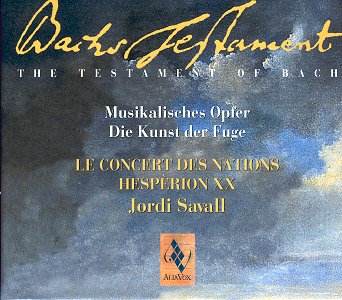The title 'Bach's Testament' well describes the music
gathered in this handsome boxed set, which features a new recording
of The Musical Offering and a reissue of a fifteen-year-old performance
of The Art of Fugue, both directed by Jordi Savall, one
of the world's most distinguished musicians in the field of 'early music'.
In the last years of his life - the 1740s - Bach gave his attention to the projects which most appealed to him. He composed the music he wanted to compose, and two works can justly be described as his 'opus summus': in vocal music, the Mass in B minor, and in instrumental music The Art of Fugue. And a third project, The Musical Offering, comes into a similar category.
The Musical Offering came into being as the direct result of Bach's appearance on 7th May 1747 at the Court of Frederick the Great at Potsdam. Frederick was himself a talented musician (a flautist) and during the course of the proceedings he gave Bach a theme on which to improvise a fugue. Bach duly did so, to the astonishment of the Emperor, but then he stated that he felt he could do better, to which end he intended 'to set Frederick's exceedingly beautiful theme to paper in a regular fugue and have it printed by means of copper engraving'.
Thus did The Musical Offering come into being, dedicated to Frederick the Great and printed at Bach's own expense. The sequence contains two ricercars, a trio sonata, and ten canons. If this plan seems unduly academic, the music proves otherwise, and offers further proof of Bach's genius in developing closely considered musical ideas with the utmost imagination.
The new recording by Le Concert des Nations directed by Jordi Savall is certainly compelling, not least because of the ambient and clear perspective of the recorded sound, which seems ideal for this repertoire. Tempi and phrasing are aptly chosen, and the individual players of the eight-strong ensemble bring a varied contribution to the committed teamwork which of necessity lies at the heart of any performance of this remarkable music. Bach intended the work as a tribute, and wrote the music with the utmost concern for detail and sincerity of expression. And these priorities are experienced in this excellent performance.
The Art of Fugue was recorded by Hespérion XX under Jordi Savall's direction as long ago as 1986. Again the recorded sound is remarkable and admirably clear, although the acoustic somehow gives the music a 'larger than life' quality. The score is by no means prescriptive as to the instrumentation, although the safest option remains keyboard: either harpsichord or organ. The ensemble Savall chooses is somewhat archaic, since it features four viols (treble, alto, tenor and bass), then occasionally cornett, trombone, oboe da caccia and bassoon.
The performances are sophisticated and skilful in the extreme, and there is no question that these are very talented players, very disciplined in their ensemble. The principal issue is one of style. Are viols to be preferred to violins in this music? The answer has to be 'probably not'. Of course Bach's music always defies easy analysis and proscriptive performance indicators, not least in this piece. And one thing that certainly supports Savall's approach is the extraordinarily appealing clarity of texture, which is lucid at every stage. However, the sound of the instruments too easily makes the music seem quaint rather than profound.
The booklet is beautifully organised and designed. But the lurking doubts about the instrumentation of The Art of Fugue make this an alternative performance rather than an essential one.
Terry Barfoot

![]() Le Concert des Nations
Le Concert des Nations
![]() Hespérion XX/Jordi
Savall
Hespérion XX/Jordi
Savall ![]() ALIA VOX AV9819 [3
CDs: 71.57,45.28, 46.57]
ALIA VOX AV9819 [3
CDs: 71.57,45.28, 46.57]